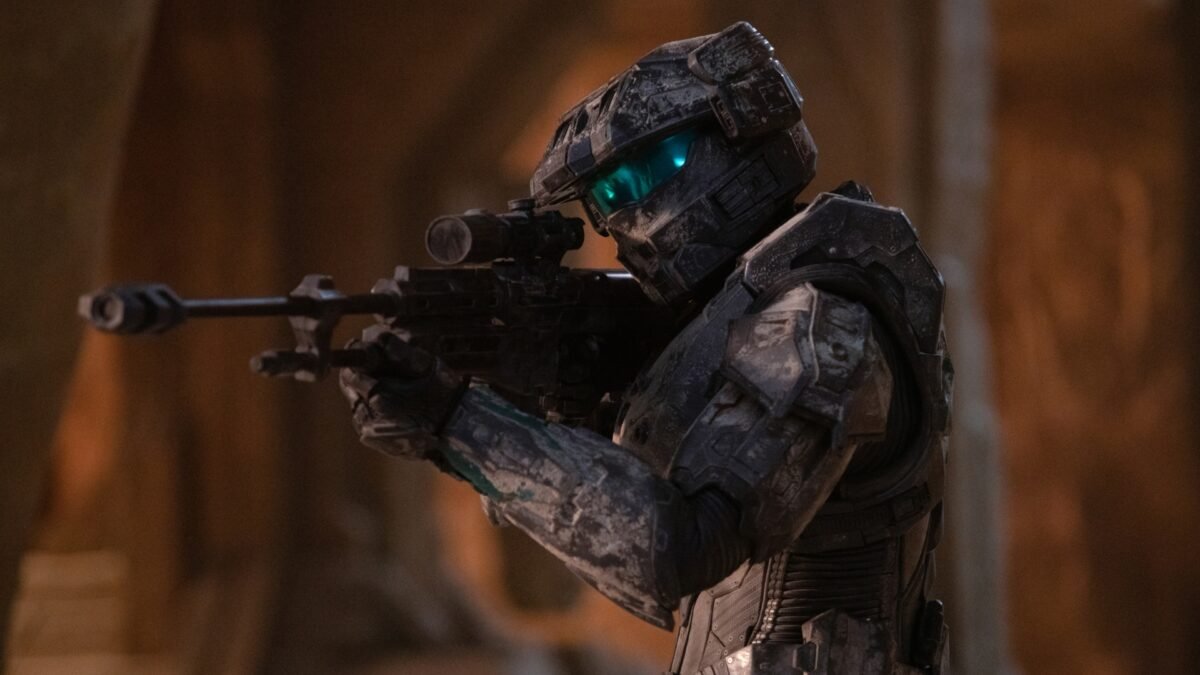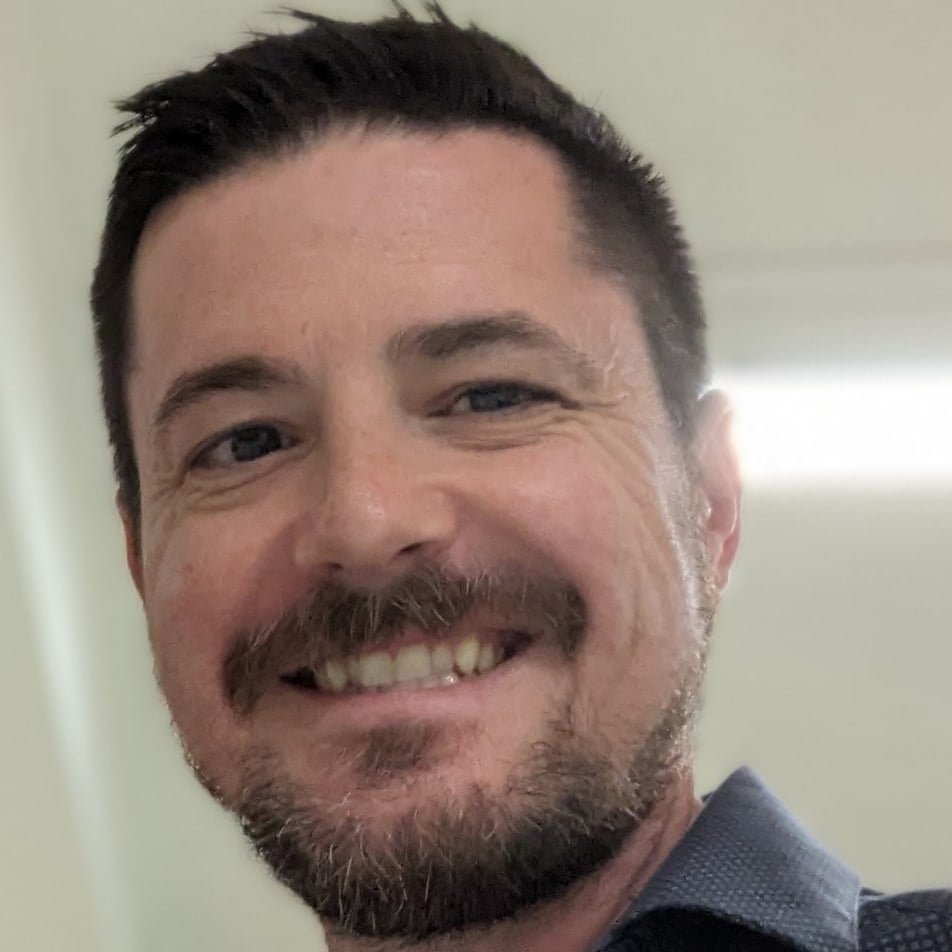Halo is a franchise beloved by many and one that has carved out its place in culture over the past 20 years. From video games to novels to cartoons, we’ve seen several iterations and perspectives on the Master Chief and the Halo universe over the years. However, in March of 2022, Paramountᐩ released the first Season of Halo for TV. A first for the franchise, this longer-form episodic approach to the Halo narrative was meant with a flurry of reactions.
With Season Two of Halo having just released, CGMagazine had the opportunity to sit down with Pablo Schreiber, the actor who takes on the role of the Master Chief. Schreiber has been acting for 20 years with some impressive roles under his belt. From The Wire to Orange Is the New Black, Schreiber has worked hard to establish himself as a superb actor, a great leader on set and an all-around nice guy.
Stepping into this second season of Halo, we wanted to get some insight into Schreiber’s thoughts on the Master Chief’s journey, his process and perspective on taking on such an iconic role and what we can excerpt from Halo season two. Sitting across from our interviewer, Schreiber was at ease and relaxed while also eager to share his excitement for all they had been working on for the second season of Halo.
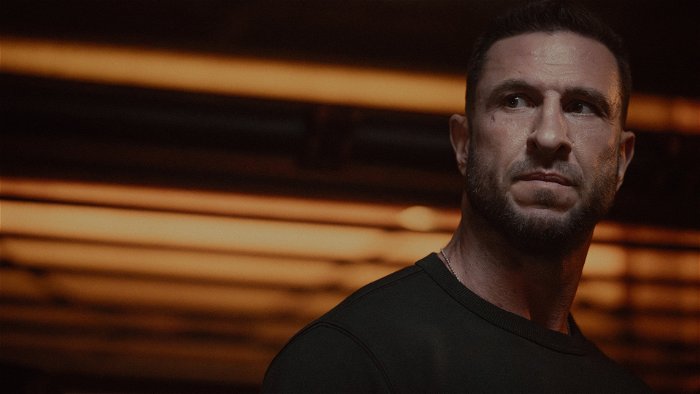
I’d love to spend some time discussing how you’re balancing the dynamics of Master Chief as this warrior, this symbol, with a very human John, who’s trying to process war, his role in it and his past. What has that experience been like for you, especially moving into Halo season two?
Pablo Schreiber: Well, it’s been fantastic. It was the original concept for the show. It was the crux of the people who hired me to do this job.
It was what they wanted to highlight in terms of adding to the Halo universe and expanding on the Halo universe. Obviously, it’s different from the experience of the video games. But for me, that’s the opportunity that’s there, right?
I get to highlight and look at the line between these two diverging personalities, where they intersect and where they don’t. And obviously, you have the Chief, who’s sort of lived this life as only that, a soldier, for the entirety of his existence. And it comes with all these expectations and preconceived notions.
And then you have the guy who’s under the armour, John, who is now just kind of discovering the other aspects of his humanity and trying to figure out what aspects of himself are his own and what aspects of himself are the UNSCs or humanities in general.
What does he owe to humanity in general in terms of being expected to save this massive population base? And what does he owe himself? And those are the basic and simple questions that I think we started the first season with. And we’ll continue those questions into the second season. So that’s, to me, the crux of the split between examining the two.
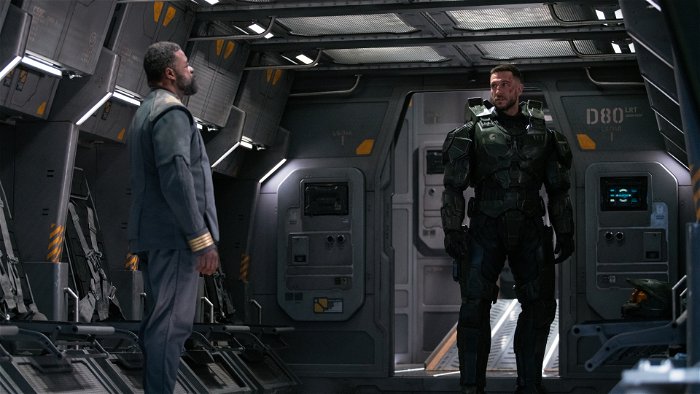
Going into Halo season two, we’re starting to see a little more of that exploration of humanity with the Spartans as a team and as individuals. What does that look like for the team as we go into the second season Halo?
Pablo Schreiber: As an actor and as the lead of the show, for me, it’s one of my great pleasures of the second season. Getting to see all these people that I’ve been working with start to have their own moments is great. And these three amazing actors who fill out the silver team with me, Kate Kennedy, who plays Kai, Natasha Kolczak, who plays Riz, and Bentley Kalu, who plays Vanek, worked tirelessly across the first season for maybe not a lot of glory. It was a very kind of confining job.
And really, a lot of it was from behind the helmet. So to see these three wonderful people and great actors start to differentiate themselves from each other and start to fill out their personalities for me, as an actor, was wonderful. And to see them run with it and knock it out of the park, as you’ll see in subsequent scenes throughout the season, was a real joy.
Then what it does for us narrative-wise is also kind of incalculable, right? To start to identify and differentiate these characters from each other, rather than just being Silver team. They’re now individuals that John gets to and has to interact with on an individual basis. So, that only deepens and enriches the world around him.
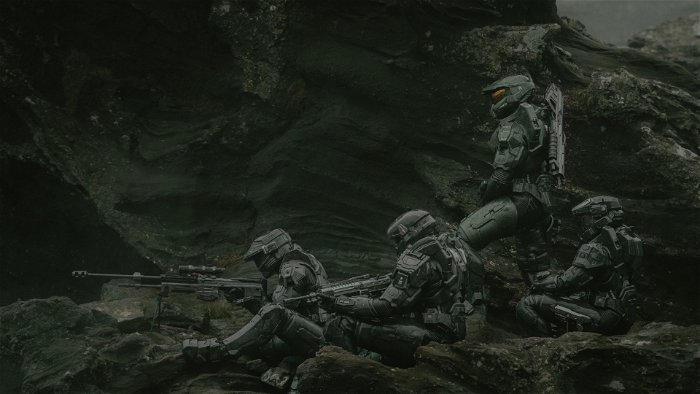
I’m excited to see how this plays out in Halo season two. I would like to go behind the scenes for a moment. I’ve heard in interviews, both yourself talking about, but also other people speaking about how you take a very direct lead role in setting the tone and the pacing for the cast and crew.
As I mentioned earlier, this is the first lead you’ve taken on. Why do you take that so much on yourself to set the tone? Also, how has that been different as a lead versus a supporting actor for you over the years?
Pablo Schreiber: Oh, well, it’s different just because I’ve been at this for 20-something years, and I’ve seen so many different iterations and versions of what TV sets look like. And one of the things that’s pretty consistent is that the tone is set by the people who are the stars, right? How it feels to be on set is, you know, it’s also set by the producers, and it’s set by the showrunners, but ultimately, the feeling of being on set, of what it feels like to shoot a show, is the tone follows the people who are the stars.
I’ve seen it done well, and I’ve seen it done terribly. it’s really important for me to create a culture that feels conducive to everybody having a chance to do their best work. Because for me it doesn’t matter how smart you are, how talented you are, or how good you are, nothing gets done in this world without collaboration, right?
You’re only as good as the people who are around you, and you’re only as good as the stories you’re telling. So number one is material and trying to improve the material and get the material to be the best version of what it can be, which is working with showrunners that you respect and that you like and that make great material. And to that note, we have an amazing showrunner this season, David Weiner, who I’m sure we’ll talk about a little bit later.
But all the way down from art directors to the guys who handle the weapons on the set to the other actors around, you want to create an environment where A, it’s fun to come to work, you know, where people are not falling asleep and phoning it in and do it, but everybody believes in what they’re doing, and people will believe in what they’re doing if you believe in what you’re doing. If they see you taking something really seriously and putting your passion into it, everyone else is gonna get behind you.
The more people you have, the more opportunities there are for energy to multiply on itself, whether it’s bad and heavy or whether it’s good and great, right? So keeping things light and loose and fun when there are a lot of people on set feels like a really important thing to do. But mostly, just providing an atmosphere where everyone feels safe to do their best work, to be their best version of themselves, is something that I don’t take lightly, and I think it goes a long way to creating a culture where you can create something good. It doesn’t mean you do, but you have the best shot at it.
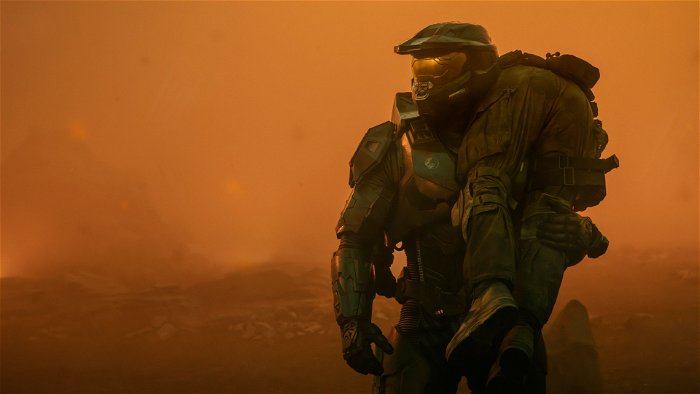
Thanks so much for giving us some perspective on that. You mentioned David Weiner has taken over as a showrunner this season. I’ve heard you talk about in other interviews that your job is to carry forward the vision of your showrunners and the direction of the director. How has that been for you to take his vision and to move that forward?
Pablo Schreiber: It’s been amazing. I think he came in with a really clear and unique vision of how he felt the world should be. The first thing he said to me is he wanted to make an eight-episode war movie. When you’re making Halo, that’s what it should be. It should feel visceral. It should feel dangerous.
It should feel like you’re in the trenches with the soldiers, and you should have that soldier perspective, from the good to the bad and the ugly. So I was excited about that. To that end, I think he brings a tone that feels more visceral and captivating and more appropriate for the Halo universe. It’s darker, it’s more immediate, it’s more dangerous. It’s more subjective, which I think is key.
You know, you’re in a lot of the battle sequences. We’re using cameras that are handheld, and they’re right in there with the movement. And so it makes you feel like you’re a part of this fight, and you’re in the middle of it rather than kind of sitting back and watching it from afar. That goes a long way toward setting and establishing the tone. I was really happy to feel those differences and contribute to them as best I could.
Absolutely. Speaking of tone and creating suspense, what’s the challenge level like for you as an actor when you’re in those sequences, and you have to communicate tension while covered in a full suit or armour? What has been your process to try to communicate and act with these limitations?
Pablo Schreiber: So I think you’re getting at kind of suit acting and how to communicate through the suit and stuff, which is obviously such a huge and critical part of the role. You know, if you’re telling the story of Master Chief and of John, you gotta tell the story of Master Chief, and you gotta do it right. You gotta see him in his element.
You have to see him in action. You have to know why he has this reputation as being so impressive. He has to behave in a way that feels appropriate to the character in terms of stoicism, in terms of strong and silent, in terms of his behaviour. Sometimes, I think in season one, people were a bit disoriented seeing John out of armour and seeing him discover new things that were so far from the experience of the video games.
Moving into season two, we’re still gonna see John, but I think maybe pushing the envelope less in terms of the experiences that, well, he’s also further along in his progression in season two, so there’s less of that. He’s a little more sure of himself in terms of the process of his human growth.
And then you have all the Chief stuff, which you really have to nail and acting in the suit is a part of that. I love it, the whole challenge of communicating without your face, communicating with subtle body movement. You have to be specific with your choices in gesture and in movement.
You can’t just move willy-nilly, which you sort of can when you’re out of the suit. When you’re in the suit, you have to be specific about movement choices. That’s a challenge, but also one that’s interesting to take on.
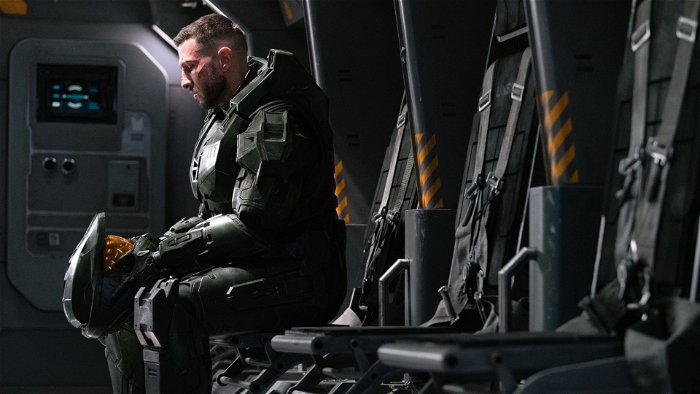
That is no small feat to essentially take on the role of two distinct characters, not just in personality but how that personality has to be communicated.
I have one last question that is a two-parter. The first part of that question is what has been the most rewarding and also challenging piece of bringing the Halo of the franchise and the Master Chief to TV in this format? Secondly, what are you most excited for people to see as we jump into Halo season two?
Pablo Schreiber: I think the logistics were a big challenge from the beginning. And I think I’ve either mentioned in this interview or have in past interviews how strong people’s connection to the Master Chief is in terms of we all played as him when we played the game.
So we all have this kind of ownership over the Chief, and we feel like he’s a part of us because we filled in his character with our personality traits and what we were intended to do when we played the game. So, that challenge of people’s preconceived notions and expectations of what the series should be and fulfilling those expectations or going differently has been one of the big challenges figuring out. But those are challenges for the people who were choosing the narrative path.
Again, I never chose the narrative path. So, for me, the challenges were really about pushing things in a direction where I thought they should go or political struggles really in terms of just trying to make the best show that I could be a part of, obviously, because if you put your face on something, you want it to be good. So, continually pushing for better has been a big process for me.
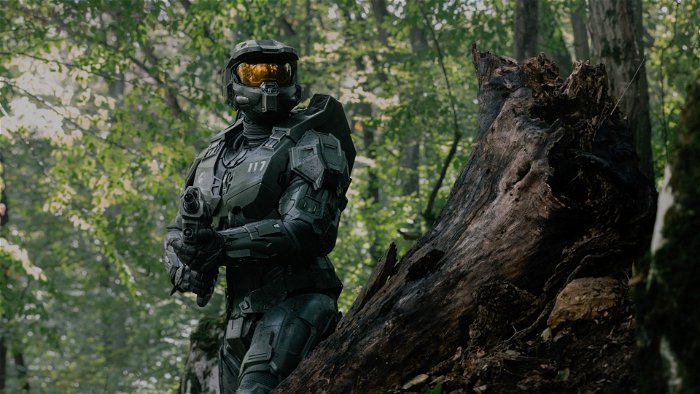
What am I excited for people to see in season two? I’m excited for them to see the match of showrunner and material, the match of tone. I think it just suits the universe better. I’m excited for fans to see a few key pieces of Halo lore that get told in this season and get visited in this season in a way that will be engaging, and possibly surprising. And again, like a different experience in video games.
You’re gonna go through these experiences differently than you did in the video game, but you’re gonna touch on them in a way that also feels familiar. And to get to see these events from a different perspective, I think, is gonna be fulfilling for a lot of people. So I’m excited for people just to come back and visit and check out season two on February 8th on Paramount+ and, hopefully, see how much we love the franchise as well.
Absolutely. Thank you so much for your time.
Pablo Schreiber: Yeah, it’s my pleasure, man. Thank you very much. I appreciate it.
